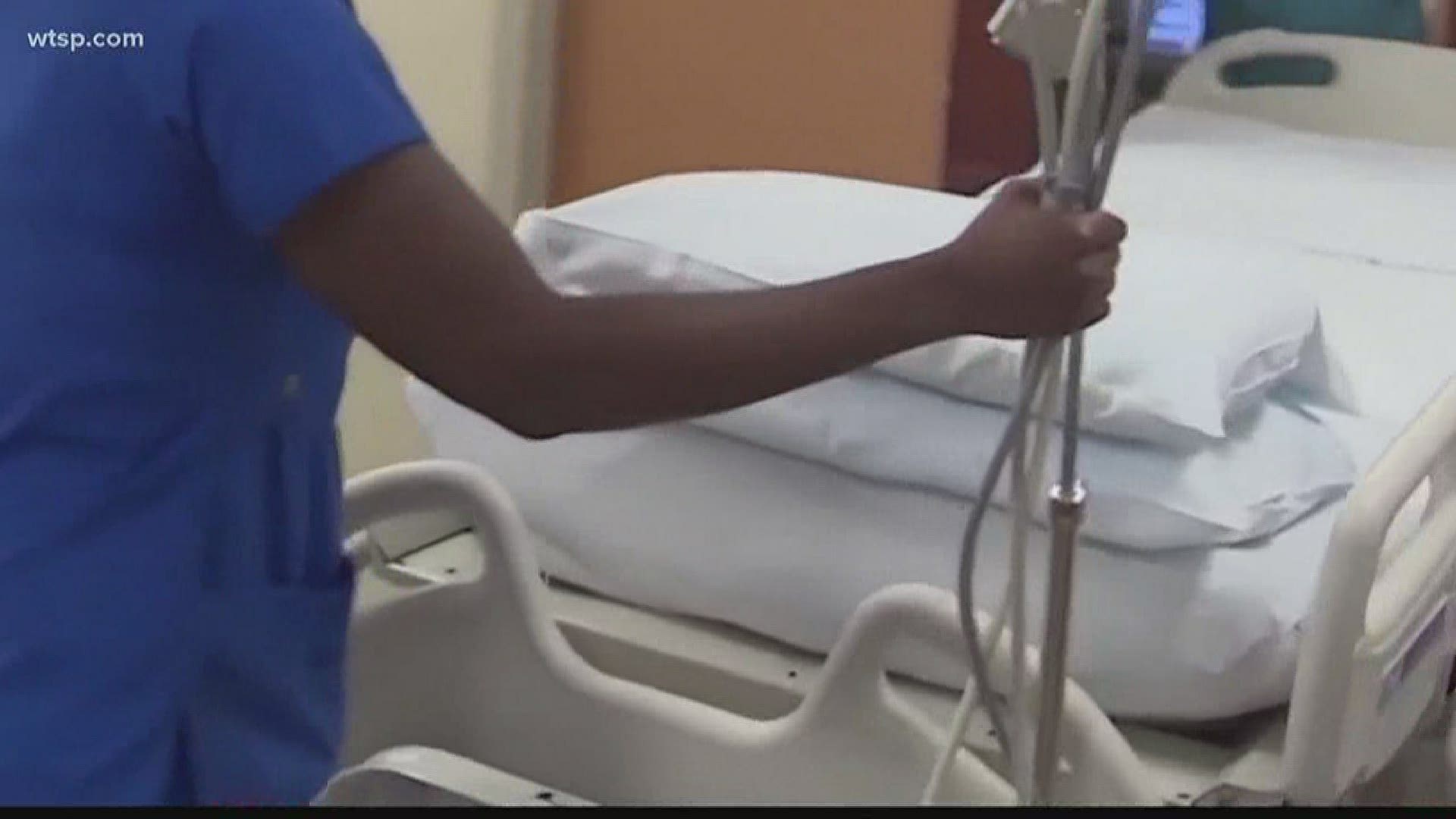This story is the latest installment in our new series called: "What's Brewing?" It's investigative reporter Jenna Bourne's homemade deep dive into issues surrounding the coronavirus pandemic. Click here to check out the series and subscribe to our new YouTube channel: The Deeper Dive.
During this COVID-19 pandemic, many are calling healthcare workers heroes.
They’re putting their own safety and the safety of their families at risk just by going to work every day.
You’ve probably seen a ton of posts thanking hospital workers in your social feed -- free meals, salutes from firefighters, the whole nine yards.
But here’s what you won’t see on social media: Some hospital workers in Tampa Bay, and across the country, are being told to stay home.
They’re getting furloughed or having their hours cut.
“We’re heroes, but we’re also victims at the same time,” said registered nurse Geniece Hunt, who works at HCA Healthcare-owned Doctors Hospital of Sarasota.
Hunt said she was furloughed the day she talked to 10Investigates.
“I am off today because of low volume,” said Hunt. “And a lot of people are getting hurt, pay-wise.”
A spokesperson for HCA tells 10Investigates employees there who get their hours cut are eligible for a pandemic pay program that keeps paying 70 percent of their base salary.
So, why are hospitals telling some healthcare workers to stay home during the biggest health crisis of our lifetime?
The bottom line: Hospitals are getting fewer patients.
Tampa General Hospital, Sarasota Memorial Hospital, and Lakeland Regional Health all say their emergency rooms have experienced about a 50 percent drop in patients over the past month or so.
But why are there so many open beds during a pandemic?
Multiple hospitals in Tampa Bay say it’s because some people aren’t seeking medical help, even during emergencies, because they’re afraid of getting infected with COVID-19 at the hospital.
“Young people in their 40s who sit at home with chest pain, refusing to come in because they are worried they will get infected with COVID -- having heart attacks and essentially dying at home, or come to the emergency department in a code-type status,” said Lakeland Regional Health Chief Medical Officer Dr. Timothy Regan.
Plus, elective surgeries -- surgeries that aren’t urgent -- have been postponed.
Fewer patients mean less profit.
“Healthcare is a business. I know people don’t like to see it that way, but it is a business. And, like, any other business, if there’s no revenue then there’s no way to pay bills,” said Dr. Uhuru Smith, chief of anesthesiology at Advanced Surgery Center of Tampa.
So, how do you cut costs while spending more on things like personal protective equipment?
The answer for many hospitals: furloughing workers and cutting back their hours.
Sarasota Memorial has been furloughing workers since the beginning of April.
“We’re continuing to pay everyone’s benefits while they’re furloughed. We’ve given people extra PTO time to be able to fall back on,” said Sarasota Memorial President and CEO David Verinder.
Tampa General tells 10Investigates it “decreased” its staff by 15 percent -- far less than the 40-60 percent decrease in patients -- because that means the hospital can still respond quickly if that patient volume increases.
A spokesperson there also says, “…we hoped it would help potentially expose less of our staff to potentially positive patients” so those employees can step in if others get infected.
10Investigates followed up to ask what “decreased” specifically means, but did not get a response.
Baycare, the largest nonprofit health care provider in West Central Florida, tells 10Investigates it has not furloughed or cut staff pay.
Instead, it has been reassigning employees to other areas that need more help -- like operating room nurses working at community screening sites instead.
Should you be afraid to go to the emergency room?
Hospitals tells 10Investigates they’re taking steps to keep you safe when you walk in the door.
At Lakeland Regional, patients with symptoms or risk factors for COVID-19 go to one area, and people who aren’t showing signs of infection go to another.
“We have gone so far as to map out our air conditioning units, our air handlers, where our duct works sits – so that patients who are at risk for COVID breathe different air than patients who are not at risk for COVID,” said Dr. Regan.
Florida hospitals may soon see some lost revenue flowing back in.
Governor Ron DeSantis announced this week that elective surgeries can start up again Monday, a huge moneymaker for hospitals.
What other people are reading right now:
- Gov. DeSantis says reopening can begin May 4, restaurants can open with restrictions
- JetBlue wants to suspend flights to Tampa
- When will Disney World reopen?
- NASA: Coronavirus has drastically improved Florida's air quality
- Publix selling green branded face masks
- Tampa nurse holds the hand of COVID-19 patients as they take their last breaths
- Two Wawa stores close after employees test positive for coronavirus
- Hotlines, websites offer the latest on COVID-19
FREE 10NEWS APP:
►Stay In the Know! Sign up now for the Brightside Blend Newsletter



